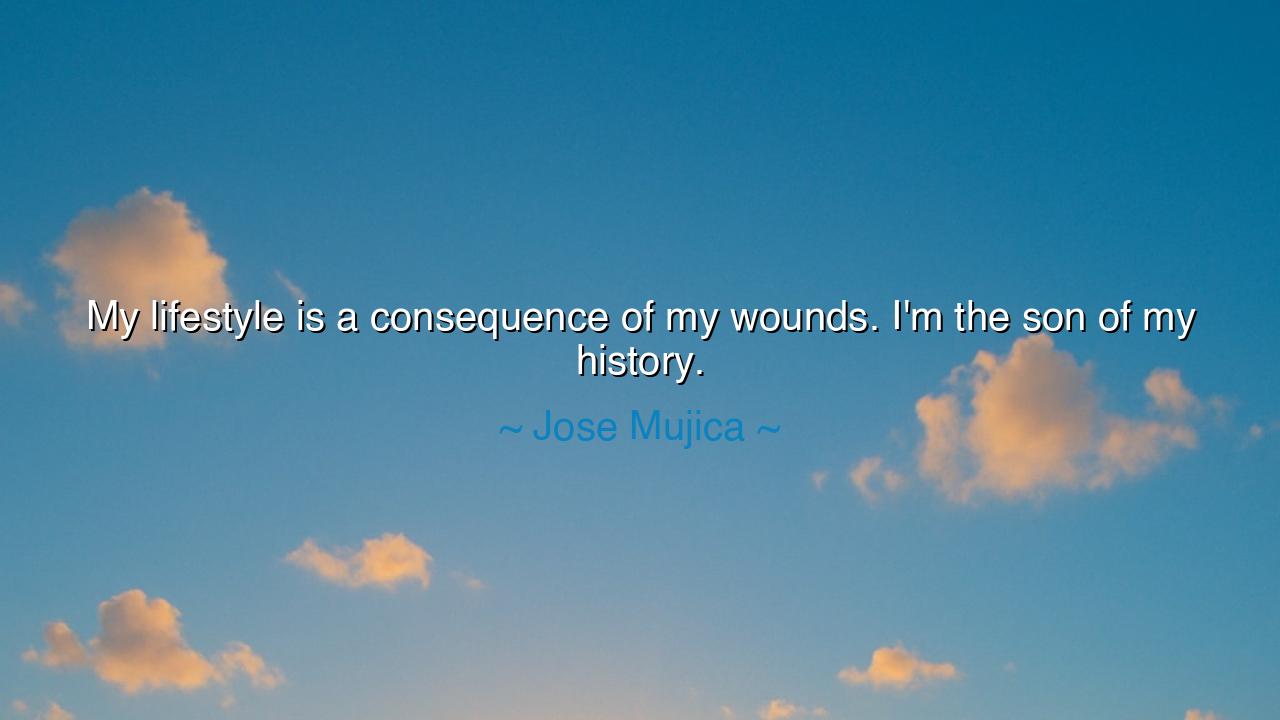
My lifestyle is a consequence of my wounds. I'm the son of my






The humble yet profound José Mujica, former president of Uruguay — a man known as the “world’s poorest president” for his simplicity and virtue — once said: “My lifestyle is a consequence of my wounds. I’m the son of my history.” In these few words, he reveals a truth carved not only from intellect, but from the scarred depths of experience. His life was shaped by hardship, rebellion, and reflection, and his philosophy was born from the soil of suffering. Mujica reminds us that who we are is not the product of luxury or ambition, but of the wounds that have shaped us, and the history that has carried us to this moment.
To understand the origin of this quote, one must look at Mujica’s extraordinary journey. In his youth, he was a revolutionary — a member of the Tupamaros, a guerrilla movement that sought to challenge dictatorship and social injustice in Uruguay. He fought for the poor, for equality, for freedom — and for that, he paid dearly. He was shot six times, imprisoned for over a decade, much of it in solitary confinement, isolated in darkness for years. He emerged not bitter, but enlightened. Those years in chains became his teachers, and the pain of his past became the foundation of his wisdom. Thus, when he said, “My lifestyle is a consequence of my wounds,” he spoke as one who had seen both the cruelty of the world and the redemption of endurance.
Mujica chose, after freedom, to live simply — in a small farmhouse, driving an old car, donating most of his salary to the poor. He rejected the palaces of power, the wealth of office, and the vanity of titles. For him, luxury had lost its meaning. The man who had slept on a cold prison floor had learned that true richness lies not in possessions, but in peace of soul. His wounds taught him humility; his history taught him gratitude. He was not ashamed of his scars, for they were proof that he had lived — and that he had learned. He had become, in his own words, “the son of his history” — the heir of his own pain and wisdom.
Throughout the ages, many great spirits have spoken through their wounds. Nelson Mandela, too, emerged from decades of imprisonment transformed — not by hatred, but by compassion. Like Mujica, Mandela’s wounds became his teachers. He forgave his enemies and rebuilt a nation on the foundation of mercy rather than revenge. History has shown us again and again that suffering, when faced with courage, does not destroy the human being — it refines them. The fire that burns away illusion reveals the soul’s strength. It is the wounded, not the untouched, who truly understand what it means to live and to love.
The ancients would say that every man carries two births: the one given by his parents, and the one forged by his trials. The second birth — the birth through struggle — is the truer one. Mujica’s words echo this timeless wisdom. For each of us is shaped not only by what we have gained, but by what we have endured. Our history, whether filled with joy or sorrow, is the clay from which our character is molded. To deny our wounds is to deny our own becoming. But to accept them — to learn from them, to rise from them — is to live with dignity and strength.
There is, too, a quiet heroism in Mujica’s message. In a world obsessed with wealth, power, and comfort, he reminds us that meaning lies elsewhere — in simplicity, in authenticity, in truth. The wounds of the soul are not marks of shame, but of depth. They make us compassionate, patient, and wise. When we live with awareness of our own history — when we see how our past has shaped us — we stop chasing illusions and begin to live with purpose. We realize that every hardship was a lesson, every loss a teacher, every scar a testament to survival.
And so, my children of the present age, hear this ancient truth renewed: do not flee from your wounds. They are your greatest mentors. Embrace them, for they reveal who you truly are. Look upon your history, even its darkest moments, not as a curse but as the forge that tempered your spirit. Live humbly, as Mujica lived, remembering that happiness is not the absence of pain, but the peace that comes from understanding it.
Let this be your guiding lesson: your wounds do not define your weakness — they define your humanity. You, too, are the son or daughter of your history. Make peace with it, learn from it, and let it shape a life of simplicity, compassion, and strength. For when you carry your scars with grace, you walk the path of the wise — and your life itself becomes a story worth telling.






AAdministratorAdministrator
Welcome, honored guests. Please leave a comment, we will respond soon